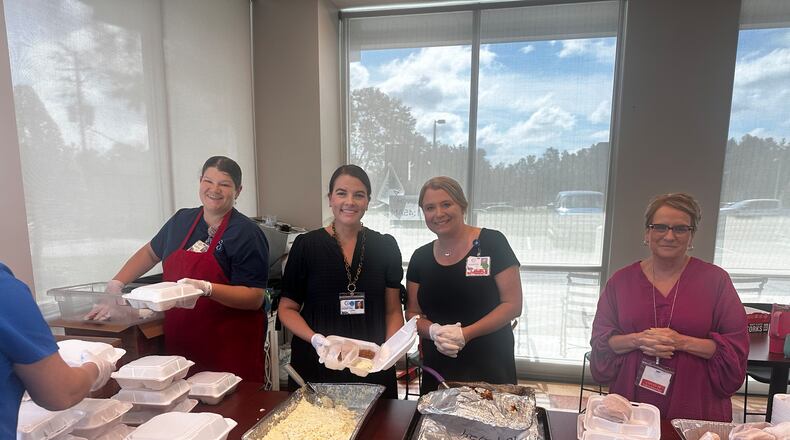For one hospital executive in South Georgia, the region’s luck ran out when Hurricane Helene touched down and ravaged her facility.
“Most hurricanes have passed us by, but that didn’t happen this time,” said Angela Ammons Handley, CEO of Clinch Memorial Hospital, a 25-bed rural hospital in Homerville in Clinch County, located in south central Georgia.
The morning after Helene, the region looked like it had been bombed, Handley said. She and her team didn’t have a moment to spare: the damaged hospital became a critical node where locals, themselves homeless due to the storm’s damage, sought food, water and refuge.
“We are feeding almost 700 people a day because the community is largely still without water,” Handley said Friday.
The facility lacked water and air conditioning for a time, but water service resumed Wednesday and full power was restored Thursday.
Credit: Clinch Memorial Hospital
Credit: Clinch Memorial Hospital
Recovery from the storm has been ongoing all week. At least 33 Georgians have died as a result of Hurricane Helene and as of Friday afternoon 216,000 customers of Georgia Power and other electric cooperatives remained without power. With over a million customers without power at the peak, Georgia Power has reported 8,000 power poles need to be replaced.
As of Friday, all Georgia hospitals have power and water, said Anna Adams of the Georgia Hospital Association.
That notwithstanding, Handley’s facility lost its newly replaced roof and is only partially back online. “We are still in survival mode,” she said.
Few gas stations are open in Valdosta, Waycross and Homerville. Those that are rarely take debit or credit cards. According to Handley, locals have struggled to access cash to buy fuel.
Clinch Memorial Hospital is providing hospital employees fuel to drive home. Yet many employees have nowhere to go and are sleeping in the hospital’s education room, their offices or in one of the cafeterias, Handley said.
“Almost all of my staff have been here 18 to 24 hours a day,” she said.
In April, The Atlanta Journal-Constitution wrote about Handley’s efforts to lobby lawmakers in Atlanta for more support to keep open rural hospitals. The irony isn’t lost on Handley that her own hospital — which nearly closed, until she was able to reduce the facility’s debt burden — is serving a critical function during this latest natural disaster.
This led to an epiphany earlier this week while she showered in cold water.
“I realized that we are going to be forgotten if we don’t ask for help. I made a Facebook post saying we need food, mobile generators, mobile showers. The response has been phenomenal,” Handley said, adding U.S. Sen. Raphael Warnock’s office checked in, and people from as far away as New Jersey and Florida have pledged help.
Though most hospitals in the region were spared the hurricane’s wrath, their employees were also rendered homeless.
“A significant number of our employees have lost their homes or are displaced,” said Erika Bennett of South Georgia Medical Center (SGMC Health), a not-for-profit medical system with more than 600 providers and 2,900 employees, in Valdosta.
The hospital is operational from a patient care standpoint, Bennett said, but SGMC has booked hotel rooms for employees and helped with basic needs via the provision of care boxes containing water and nonperishable food.
“The biggest issue is showering — helping schedule showers for people within the facility. We are also helping them wash clothes,” Bennett said. She estimated half of SGMC’s employees who responded to a survey this week are still without power, and a quarter lack running water.
Doctors Hospital of Augusta also realized they needed to care for their staff impacted by the storm. The 354-bed acute care hospital offered a range of free services to their staff from food to child care so they would be better able to care for patients after the storm.
“Our goal was to ensure that our team had the resources they needed during this challenging time,” said Lindsay Black, director of communications and community engagement.
Doctors Hospital, one of several in Augusta, provided free meals, arranged for emergency housing for staff whose homes were severely impacted, and started a day camp for children. The hospital even set up a pop-up grocery store with shelf-stable essentials, Black told the AJC.
Area hospitals are pitching in to help during the crisis, said Robin Rau, CEO of The Hospital Authority Miller County. “We had absolutely no damage here. Angela’s hospital (Clinch Memorial) and community have been damaged. I sent an RV, supplies, portable showers, 1,500 pounds of beef and pork so they could feed their community.”
Rau said her hospital will shift next to helping Lanier County. “Clint, Valdosta, that whole swathe is very troubled right now,” she added.
On her Facebook page, Handley has asked people in Georgia and beyond to make tax deductible donations to Clinch Memorial via the Georgia Heart Program for rural hospitals.
Roni Robbins, a freelancer for The Atlanta Journal-Constitution, contributed to this story.
About the Author
Keep Reading
The Latest
Featured





